
CINEMATIC ALLUSIONS TO LITERARY WORKS
BLOW-UP (1966)
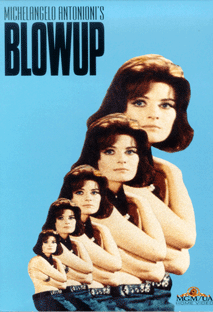
In the opening credits of Blow-Up, Italian director Michelangelo Antonioni acknowledges that his film is based on "Las babas del diablo" ("The Devil's Drool"), a short story by Argentinean writer Julio Cortázar.
Blow-Up is Antonioni's view of the world of mod fashion, and an engaging, provocative murder mystery that examines the nature of reality through photography. In the sixties, swinging London was seen all over Europe as the center of change and the origin of new trends in music and fashion.
The central character, Thomas, is a high-fashion photographer who lives in mid-1960's London. He has becomes bored with his lucrative career of glamour photography. So he resorts to photographing, in documentary style, the seamy and sordid side of life in London's flophouses and slums.
Casually, he takes candid photos in a deserted park of a lover's tryst-rendezvous between a woman and a middle-aged, gray-haired man. When the woman sees that she is been photographed, she pursues him to ask for the illicit photos, and he imagines that he has witnessed a scene of sexual intrigue - never thinking that he may have accidentally obtained visual, criminal evidence of a murder.
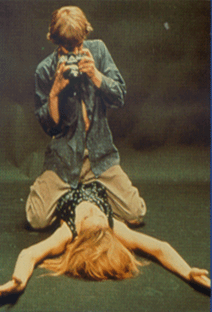
Thomas begins to develop the shots. When he makes enlargements of some of the prints, he discovers what looks like a body. Thomas returns to the park and sees (or imagines he sees) a body. Returning to his studio, Thomas finds out that the blow-ups have been stolen and that the only one left is a very confusing print. Finally, Thomas goes back to the park, but he is not able to find the body.
In the short story by Cortázar, the focus is the seduction scene, whether real or imagined, between a woman, a young boy and a man, just as the murder mystery is the focus of the Antonioni film. Reality becomes a subjective statement in both the story and the film that explores the confusion of events directly or indirectly through the medium of photography.
Julio A. Rosario, Ph.D.
Associate Professor, Library
Blow-Up. Michelangelo Antonioni. Perf. David Hemmings, and Vanessa Redgrave. Videocassette. MGM/UA, 1966.
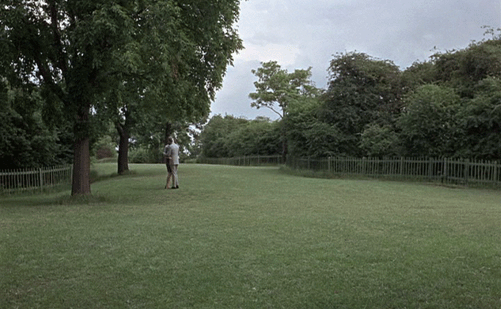 |
Thomas (David Hemmings) sees a man and a woman (Vanessa Redgrave) having an innocent rendezvous in the park. What I'd thought was a couple seemed much more now a boy with his mother, although at the same time I realized that it was not a kid and his mother, and that it was a couple in the sense that we always allegate to couples when we see them leaning up against the parapets or embracing on the benches in the squares. |
The woman (Vanessa Redgrave) realizes that Thomas (David Hemmings) is taking her picture with the man in the park. She approaches Thomas and tells him she wants the roll of film back. The woman said that no one had the right to take a picture without permission, and demanded that I hand over the film. |
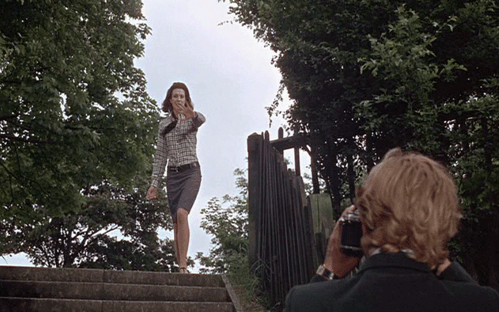 |
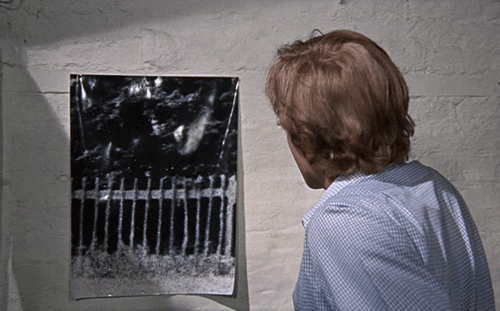 |
Thomas (David Hemmings) in his studio inspects one of the enlargements of the photograph he took in the park. In one of the enlargements he discovers a hidden figure in the foliage. From my chair, with the typewriter directly in front of me, I looked at the photo ten feet away, and then it occurred to me that I had hung it exactly at the point of view of the lens. |
Cortázar, Julio. "Blow-Up." Blow-Up and Other Stories. Trans. Paul Blackburn. New York: Pantheon Books, 1985. 114-131.
Incledon, John. "From Short Story to Feature Film: Three from Latin America."
Anuario de Cine y Literatura en Espańol: An International Journal on Film and Literature (1995): 47-53.
Sanjinés, José. "'Blow Up': A House with Many Stories." Point of Contact 4:1 (1994): 46-55.
Wagstaff, Chris. "Sexual Noise." Sight and Sound May 1997: 32-35.
| Previous Movie | Return to main page | Next Movie |
Copyright © The City College Library www1.ccny.cuny.edu/library |
||